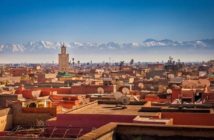NBC CHICAGO
SCOTT HUVER
Don’t mess with “Hunted” star Melissa George.
The Australian-born actress – best known for her TV turns on “Alias” and “In Treatment” – returns to the small screen, and while her new series airs on Cinemax, a pay cable network known for its late night lack of wardrobe, she’s fighting to get the word out that her new espionage thriller is a class act, co-produced by HBO and the BBC. And like its companion series “Strike Back,” “Hunted’ is a full-tilt action-fest, leaving George feeling fully capable of defending the show’s honor, as PopcornBiz found out.
So even though we’ll be watching the show on Cinemax, we shouldn’t expect a certain, uh, physicality to the role beyond the kick-ass action?
Take it easy! First of all, there’s no fighting naked – rule number one. Rule number two: it’s HBO. They’re not going to have you running around naked. You’re talking about replays of movies that they show on After Hours two years ago. Since then, there’s no Skinemax, as I’m sure you’re referring to.
HBO also makes ‘True Blood,’ and so you never know what you’ll get called upon to do, right?
Yeah, but fighting naked? Who the hell do you think that I am? I’m feisty, so watch out!
What percentage of stunts would you say you’re doing?
Well, all of it, as you can see there: It’s my face. I got few injuries running around in London. The others, not so much – me: a split lip. A black eye, a cut face. I’ve got a very bad hand and I’ve got a very bad left hip, which I’m getting better before next season.
Are you used to that level of physicality?
Not really, no. I do ‘In Treatment’ where I’m sitting on a sofa and then I do ‘The Slap’ which is not really anything physical at all. This one shocks you a little bit because it’s not just one hour a week. It’s actually eight hours a day and your body does wear, because it’s violent. It’s a lot of aggression and a lot of quick moves. It’s not low-impact. It does shock your body. I pick up fights very, very easily, and I don’t want to just make it look like a fight, as you can see. It’s so real. It’s not fancy, new moves. It’s just fighting for your life. Oh, yeah. When you see that all on the show, when you see the fight in Tangier, in Morocco, it’s very realistic.
What was it like doing the scenes where you had little or no dialogue?
We always say that the camera photographs thought. When we’re feeling it you’re feeling it. Words get in the way of a good story, I believe. You speak when you need to. In this case, it’s a lot of intimate, internal struggle. She’s speaking French in the first five minutes. She’s speaking Spanish. She’s speaking Arabic. She’s got a lot of languages, but when you see her in Scotland there’s no one to talk to. So a less cinematic show would pick up the phone probably and explain the narrative to a friend on the phone. What we did is remove that. You know what she’s feeling. You know what she needs to say, but you want to wait to hear it.
And you have a real international cast. What’s that been like?
I live in New York, am an American citizen. I’ve lived here since ’98. This is created by an American, shot in Europe. I’m an American nanny in this and a British girl. So really, it’s showing that television can be all things and Americans love that. They love international shows….When I read a script and there’s three moments that touch me – I’m in. In the first one it’s the storyline about losing her child. It was the moment where she sees her love after a long time and it’s the fact that it shot in Morocco, Scotland and London. Within in the first 30 minutes we’re in three countries. Fabulous.
How important is it for you to get away and experience the places that you’re in?
It’s really important for your life, but also for the character. She was at the top of her game in Morocco. So, I had a guide take me for two full days to all the places that Sam would’ve gone to really feel it, really love it and really get into it. That was a lot of fun.
Have you been an extensive world traveler in your own life?
Yeah. I have homes in Buenos Aires, New York City and I’m living in Paris now. It’s good and bad. I think sometimes it makes you feel confused as to where your center is, because you’re so stimulated by different accents, languages and food and culture and you kind of love it all. At the end of a year you’re like, ‘Okay, where was I?’ Sometimes when you live and work, like I’m sure most of the world does, you live in your home and you go to work, you have a sense of balance and a sense of stability. That’s the negative of what I don’t have. But at the same time you’re a gypsy and that’s the lifestyle of an actor.
Photo Credit: WireImage
.







